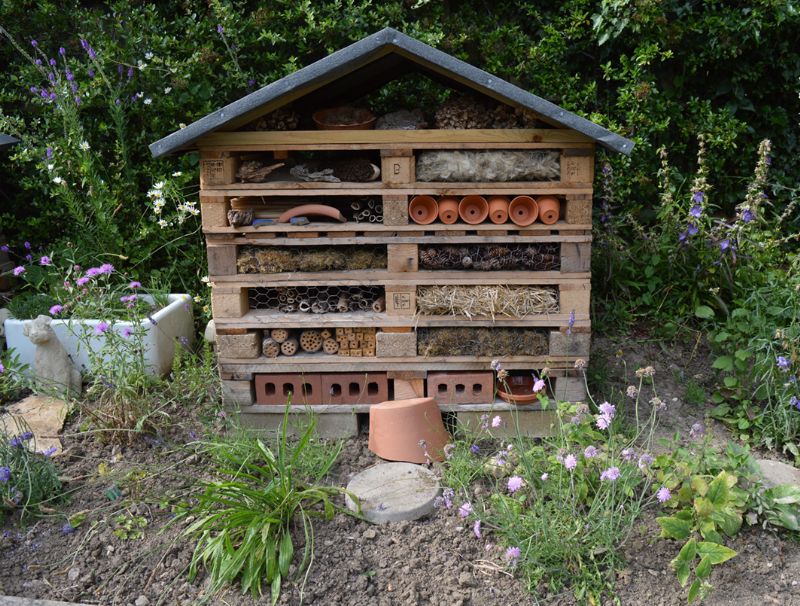- Home
- News, Articles & Reviews
We are hiring! Please click here to join our growing magazine delivery team in Gloucestershire!
Areas
Pets & Wildlife
Archive

A winter project for wildlife
All Areas > Pets & Wildlife > Wildlife Matters
Author: Helen Kingscott, Posted: Monday, 25th November 2019, 09:00
I have wanted an insect house in my garden for a while, so back in March I persuaded my husband to build one for me – well, two actually!
They were really easy to make and I’ve enjoyed filling them with all kinds of materials to encourage wildlife to make themselves a home.
I have been really surprised by how many people have commented on them as they walk past my garden, and most have asked to take a picture so they can make one themselves.
So I decided to show you how I did it. The image on the right shows the nearly finished house (I am still filling some of the gaps) and you can find the rest of the photos by following this link, which also has instructions of how they were made.
I have also made a couple of natural hedgehog houses and, although I haven’t checked as I don’t want to disturb them, I hope my hedgehogs are fast asleep. I’ve also written an article about this, which you can find here.
Hibernating species
Lots of people think squirrels hibernate, but they don’t. They just stay in their cosy beds and sleep for 18-20 hours a day, only popping out to eat some of the food they have buried for a rainy day. They will have grown a thicker coat and wrap their fluffy tails around them when they go to sleep.
New queen bumblebees ‘hibernate’ alone underground or in long grass, with their vital fat stores helping them survive the winter. Come the spring, the warmer temperatures wake the queens and they seek nectar to feed on before finding a suitable nest site for the year. This is why it is good to plant crocus, snowdrops, hyacinth and primroses for them to feed on when they wake.
Solitary bees look for hollow stems or little holes in wood or bamboo canes, as you’ll see in my insect houses. Look at my pictures online to see them creating a winter home to lay their eggs.
Toads, frogs and newts will usually leave their ponds to ‘hibernate’ in the winter. They love rockeries, woodpiles, compost heaps, old plant pots and greenhouses – they make you jump when you go to clean it out in the spring!
If you read my ‘how to make an insect house’ article, it explains about frogs using the gap under the pallets, where I’ve put old house tiles/slates for them to crawl beneath. If you have a deep pond they may also sleep on the bottom.
Try not to tidy your garden too much this winter, as you will be removing most of the shelter for wildlife and leaving overwintering invertebrates homeless. So leave seed heads on your alliums, teasels, sea holly, echinops, and any hollow standing plant stems.
Hiding places and food for beneficial insects
Ladybirds, lacewings and wasps will wait out the winter under loose bark on logs, piles of stones and twigs. Leaf litter is mulch that also provides hiding places and food for beneficial insects like ground beetles, centipedes, millipedes and spiders. Eventually, the worms will drag the mulch down from the surface and eat it, enriching the soil.
A full step-by-step guide to making your own insect house can be found here.
If you create one yourself, please send us your photos – admin@thelocalanswer.co.ukCopyright © 2026 The Local Answer Limited.
Unauthorized use and/or duplication of this material without express and written permission from this site's author and/or owner is strictly prohibited. Excerpts and links may be used, provided that full and clear credit is given to The Local Answer Limited and thelocalanswer.co.uk with appropriate and specific direction to the original content.More articles you may be interested in...


© 2026 The Local Answer Limited - Registered in England and Wales - Company No. 06929408
Unit H, Churchill Industrial Estate, Churchill Road, Leckhampton, Cheltenham, GL53 7EG - VAT Registration No. 975613000You are leaving the TLA website...
You are now leaving the TLA website and are going to a website that is not operated by us. The Local Answer are not responsible for the content or availability of linked sites, and cannot accept liability if the linked site has been compromised and contains unsuitable images or other content. If you wish to proceed, please click the "Continue" button below:




